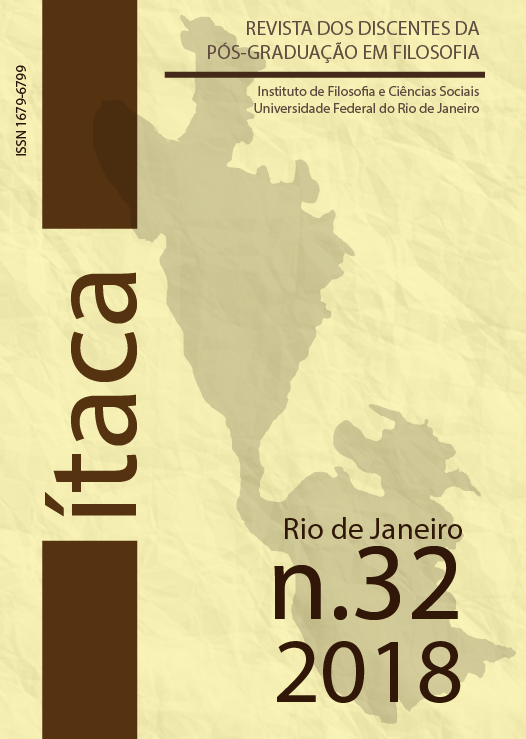Verdade e justiça: moral e política em Rawls e Dworkin
DOI:
https://doi.org/10.59488/itaca.v0i32.17485Palabras clave:
JOHN RAWLS, RONALD DWORKIN, VERDADE MORAL, JUSTIFICAÇÃO POLÍTICA, LIBERALISMOResumen
O artigo busca questionar a ideia de Rawls de justificação política independente da verdade moral. Inicialmente é apresentada a sua contribuição para o retorno da questão da verdade moral ao debate filosófico. Apresenta-se, em seguida, a evolução de sua perspectiva acerca do papel da moralidade na fundamentação da política. Na terceira parte, é feita uma breve introdução à tese de Dworkin da unidade do valor, a fim de exemplificar uma abordagem igualmente liberal que adota uma concepção de política vinculada a uma teoria moral compreensiva. No final, alguns argumentos são apresentados em favor da abordagem de Dworkin sobre essa questão.Citas
ALTMAN, Andrew. Rawls' pragmatic turn. Journal of Social Philosophy, v. 14, 1983, p. 8--12. Disponível em: <https://doi.org/10.1111/j.1467-9833.1983.tb00567.x>. Acesso em: 28 abr. 2018.
AUDI, Robert. Foundationalism, coherentism, and epistemological dogmatism. Philosophical Perspectives, v. 2, 1988, p. 407-442. Disponível em: <http://www.jstor.org/stable/2214083>. Acesso em: 28 abr. 2018.
AYER, Alfred. Language, truth and logic. Harmondsworth: Penguin Books, 1971 [1936]
BERLIN, Isaiah. Two concepts of liberty. In: ______. Four essays on liberty. Oxford: Oxford University Press, 1969, p. 118-172.
BLACKBURN, Simon. Is Objective Moral Justification Possible on a Quasi-realist Foundation? Inquiry, v. 42, n.2, 1999, p. 213-227.
Disponível em: <https://doi.org/10.1080/002017499321552>. Acesso em: 28 abr. 2018.
COHEN, Joshua. For a Democratic Society. In: FREEMAN, Samuel. The Cambridge Companion to Rawls. Cambridge: Cambridge University Press, 2003, p. 86-138.
______. Truth and Public Reason. Philosophy and Public Affairs. v. 37, n. 1, 2009, pp. 2-42. Disponível em: <https://doi.org/10.1111/j.1088-4963.2008.01144.x>. Acesso em: 28 abr. 2018.
DIAS, Maria Clara. Sobre nós: expandindo as fronteiras da moralidade. Rio de Janeiro: Pirilampo, 2016.
DWORKIN, Ronald. Justice for Hedgehogs. Cambridge: Belknap Press, 2011.
HARE, Richard. Moral Thinking: Its levels, method and point. Oxford: Clarendon Press, 1981.
HARMAN, Gilbert. Moral relativism is moral realism. Philosophical Studies, v. 172, n. 5, p. 855-863, apr. 2015. Disponível em: <http://dx.doi.org/10.1007/s11098-014-0298-8>. Acesso em: 28 abr. 2018.
KAGAN, Shelly. Normative Ethics. Boulder: Westview Press, 1998.
KYMLICKA, Will. Liberalism and Communitarianism. Canadian Journal of Philosophy, v. 18, n. 2, 1988, p. 181-203. Disponível em: <https://doi.org/10.1080/00455091.1988.10717173>. Acesso em: 28 abr. 2018.
MACKIE, J.L.. Ethics: Inventing right and wrong. London: Penguin Books, 1977.
MCMAHAN, Jeff. Moral Intuition. In: LAFOLLETTE, Hugh; PERSSON, Ingmar (eds.). Blackwell Guide to Ethical Theory. 2nd ed. Oxford: Blackwell, 2013.
MOORE, George Edward. Principia Ethica. Cambridge: Cambridge University Press, 1922 [1903].
NUSSBAUM, Martha. Frontiers of justice: disability, nationality, species membership. Cambridge: Belknap Press, 2006.
RAWLS, John. The Independence of Moral Theory. Proceedings and Addresses of the American Philosophical Association, v. 48, 1975, p. 5-22. Disponível em: <http://www.jstor.org/stable/3129858>. Acesso em: 28 abr. 2018.
______. Kantian Constructivism in Moral Theory. The Journal of Philosophy, v. 77, n. 9, 1980, p. 515-572. Disponível em: <http://www.jstor.org/stable/2025790>. Acesso em: 28 abr. 2018.
______. The Basic Liberties and Their Priority. In: MCMURRIN, Sterling (ed). The Tanner Lectures on Human Values. Volume 3. Cambridge: Cambridge University Press, 1982. p. 3-87. Disponível em: <https://tannerlectures.utah.edu/_documents/a-to-z/r/rawls82.pdf>. Acesso em: 28 abr. 2018.
______. Justice as Fairness: political not metaphysical. Philosophy and Public Affairs, v. 14, n. 3, 1985, p. 223-251. Disponível em: <http://www.jstor.org/stable/2265349>. Acesso em: 28 abr. 2018.
______. The Priority of Right and Ideas of the Good. Philosophy and Public Affairs, v. 17, n. 4, 1988, p. 251-276. Disponível em: < http://www.jstor.org/stable/2265400>. Acesso em: 28 abr. 2018.
______. The Idea of Public Reason Revisited. The University of Chicago Law Review, v. 64, n. 3, 1997, p. 765-807. Disponível em: < https://chicagounbound.uchicago.edu/cgi/viewcontent.cgi?article=5633&context=uclrev>. Acesso em: 28 abr. 2018.
______. A Theory of Justice. rev. ed. Cambridge: Belknap Press, 1999.
______. Justice as Fairness: a Restatement. Cambridge: Belknap Press, 2001.
______. Political Liberalism. Expanded edition. New York: Columbia University Press, 2005.
SCANLON, Thomas. Rawls on Justification. FREEMAN, Samuel. The Cambridge Companion to Rawls. Cambridge: Cambridge University Press, 2003. p. 86-138.
Descargas
Publicado
Número
Sección
Licencia
Os autores, ao enviar textos para possível publicação, concordam com os seguintes termos:
1. Os autores mantêm os direitos autorais e concedem à revista o direito de primeira publicação.
2. A publicação é licenciada sob a Creative Commons Atribuição - Não Comercial - Compartilha Igual 4.0 Internacional (CC BY-NC-SA 4.0).
3. O autor está autorizado a publicar o trabalho em outras revistas ou como capítulo de livro, desde que a distribuição não seja exclusiva e indique a primeira publicação nesta revista.
4. O autor é incentivado a divulgar e disponibilizar o trabalho aprovado para publicação nesta revista em quaisquer meios, desde que essa versão divulgada seja a mesma enviada para avaliação e, posteriormente, seja alterada pela versão publicada.


